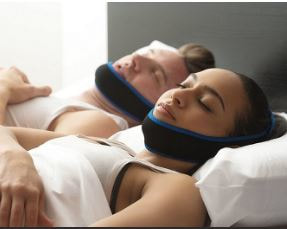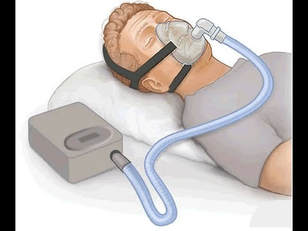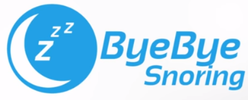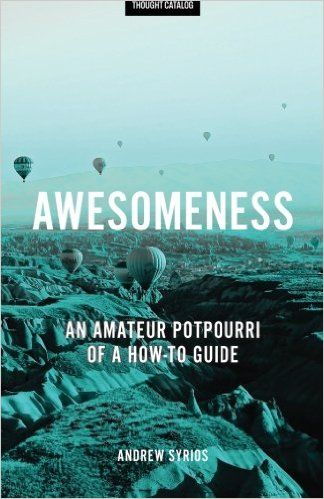|
Sometimes the best way to learn how to do something is to see it done wrong. And I came across such a case of marketing gone awry in a recent Graduate class assignment:The Anti-Snore Strap that was created by ByeBye Snoring. (1) The product was developed by James Bradshaw and consists of a strap that wraps around your head and holds your jaws slightly forward to keep your airways open. (2) As the WebMD notes, “Snoring occurs when the flow of air through the mouth and nose is physically obstructed. Air flow can be obstructed by a combination of factors.” (3) One of the most common factors is having “obstructed nasal airways.” By keeping the jaw slightly forward, this keeps the nasal airways open. That being said, the product fits into a very small niche, although it doesn’t seem to be aware of that. First of all, people who only have minor snoring issues can use simpler and cheaper products, such as nasal strips that can help open airways. Those who have serious problems with snoring probably have sleep apnea, which the ads and website for this product doesn’t mention or claim to be able to address. Sleep apnea is, as the Mayo Clinic describes, “a potentially serious sleep disorder in which breathing repeatedly stops and starts. If you snore loudly and feel tired even after a full night's sleep, you might have sleep apnea.” (4) People who have sleep apnea are often sleep deprived as they briefly wake up each time they stop breathing. Having sleep apnea can lead to all sorts of health-related problems such as daytime fatigue, high blood pressure, Type 2 diabetes and metabolic syndrome. It is a serious medical condition and is generally covered by insurance. In the more extreme cases, patients are given a CPAP machine which pushes oxygen into their lungs while they sleep. Right from the beginning, ByeBye Snoring’s marketing is flawed because, in all likelihood, they were unable to get it approved by the FDA as a solution for sleep apnea. A CPAP machine is rather obnoxious to wear, so alternatives (such as oral appliances) are preferred. That being said, ByeBye Snoring’s chin strap doesn’t look particularly comfortable either and many people will likely be turned off from buying it for that reason. And the fact that nowhere on the website or in its two-minute-long video advertisement is sleep apnea even mentioned—let alone is there anything about the FDA having approved it as a form of treatment—hurts this product greatly. Indeed, in the video advertisement, it notes that the product was featured on the television show My American Medical Review. It also rather weakly points out that “[ByeBye Snoring] has become a popular way to help prevent snoring.” (5) There are no testimonials from either patients or medical practitioners, which is a very noteworthy omission. In my estimation, consumers are going to pick up on what is not being said. It would appear that the marketing campaign for ByeBye Snoring’s Anti-Snore Chinstrap was hurt on the backend. With any sort of medical device, some sort of authority lending its credibility to the product would prove immensely important. There is a vast array of different products out there and people have become more and more aware of various scams. Without some sort of noteworthy certification (say for use with regards to sleep apnea) or a recommendation by a noteworthy medical institution or doctor, the product’s marketing comes off as amateur. Even noting that it appeared on a TV show seems to do it more harm than good. The question that immediately came to my mind was “is that really the best you can say for it?” The television advertisement also oscillates from making its pitch to people who snore and to people whose spouse snores. This ad starts with, “Do you sleep with someone who sounds like a chainsaw? Does snoring keep you awake or keep you apart? If you live with someone who snores, you know it’s no joke.” Then near the end, the ad says, “Not only will you stop snoring instantly, but you’ll also wake up feeling rested and refreshed.” While it makes sense to market to both those who snore and those who don’t, there should be a focus that runs throughout the ad. There isn’t, and it makes the ad feel very impersonal (who is the ad talking to?) and unfocused. This lack of focus runs throughout ByeBye Snoring’s marketing. The company is primarily focused on its one key product; the My Snoring Solution Anti-Snore Chinstraps. Yet the website is ByeByeSnoring.com. MySnoringSolution.com leads to a completely different company’s website. People have a hard time keeping multiple things in their mind and thus, it is critically important to focus on branding. Instead, the product is called My Snoring Solution (at least I think it is, the words “My Snoring Solution” do not appear on the website), yet the company is named ByeBye Snoring even though it only appears to have this one product. Even the symbols used for My Snoring Solution and ByeBye Snoring are different: This lack of consistency also plays hand-in-hand with the lack of anything memorable about the ad. There is no jingle or story or anything that will stick in the consumer’s crowded mind after the advertisement has been seen. These types of ads are likely to be quickly forgotten.
Finally, the ad ends by coming off as rather desperate, “If you are not sure if My Snoring Solution is for you, then at ByeByeSnoring.com, we provide a 100 percent unbiased review of the My Snoring Solution chin strap based on unbiased user feedback.” (6) No one seriously believes that a product’s website will have “unbiased user feedback.” Indeed, the website itself looks like a rather cheap splash landing page. In fact, the whole sales pitch appears to be a gimmick. It says that the chinstrap is free. All you have to pay is the shipping and handling costs of $12.95. $12.95 is, quite obviously, far more than is needed to ship a simple chin strap. It seems that the company is making its money by merging the profit, costs and shipping into the shipping and handling cost and then pretending that the product is free. When people hear something is free, they immediately start wondering what the catch is. On the website, it notes that the shipping and handling is $12.95 and then two lines down in big bold letters it reads “There is No Catch!” Which is a weird thing to say since it just told us what the “catch” was a few sentences earlier. And it gets even worse. The user feedback is a screenshot of Amazon.com user ratings. Nowhere is there a link to the Amazon page and while Amazon is full of various chin straps for snoring, (7) the only product that comes up for either ByeBye Snoring or My Snoring Solution) has only one review. The screenshot on ByeBye Snoring’s website shows three reviews. (8) All these various problems make it unlikely that ByeBye Snoring will be able to convince consumers to trust them. I couldn’t find anything on US Patent Office’s website, which implies they have no patent on the product. And given that there are many other chin straps available, this presents a huge problem. The market (which is relatively small to begin with) is saturated with substitutable products. And ByeBye Snoring doesn’t do much to convince consumers to choose them over any other brand. As should be obvious from the above, I was thoroughly unimpressed with ByeBye Snoring’s marketing for its Anti-Snore Chinstrap. The website appears to be inactive and it appears the company may have even gone out of business. All of which goes to show that getting “seen on TV” is not enough. A good marketing campaign is essential for any product to be successful.
Comments
|
Andrew Syrios"Every day is a new life to the wise man." Archives
November 2022
Blog Roll
The Real Estate Brothers The Good Stewards Bigger Pockets REI Club Meet Kevin Tim Ferris Joe Rogan Adam Carolla MAREI 1500 Days Worcester Investments Just Ask Ben Why Entrepreneur Inc. KC Source Link The Righteous Mind Star Slate Codex Mises Institute Tom Woods Michael Tracey Consulting by RPM The Scott Horton Show Swift Economics The Critical Drinker Red Letter Media Categories |




 RSS Feed
RSS Feed


